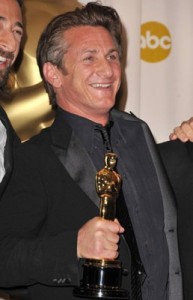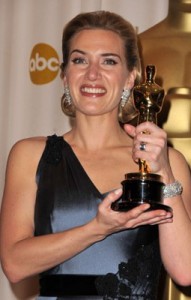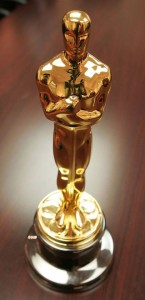 So the ’09 Oscar season has come and gone, and I’ve managed to blog (sporadically, I know) through a full calendar year without making so much as a post on it. See, while I appreciate that the Academy Awards help to mark the passing of time in the movie-going world, I’m not obsessive enough about them—unlike certain bloggers I admire, bless ’em—to bother watching nominated movies (or even movies merely hyped for a nomination) that I don’t expect to at least give me a good time. Up to now I’ve managed to avoid The Blind Side, Crazy Heart, Invictus, The Last Station, The Lovely Bones, Nine, A Serious Man, A Single Man, Up in the Air and The Young Victoria, and there’s nothing I’ve heard about those movies beyond their Oscar hype that remotely compels me to them.
So the ’09 Oscar season has come and gone, and I’ve managed to blog (sporadically, I know) through a full calendar year without making so much as a post on it. See, while I appreciate that the Academy Awards help to mark the passing of time in the movie-going world, I’m not obsessive enough about them—unlike certain bloggers I admire, bless ’em—to bother watching nominated movies (or even movies merely hyped for a nomination) that I don’t expect to at least give me a good time. Up to now I’ve managed to avoid The Blind Side, Crazy Heart, Invictus, The Last Station, The Lovely Bones, Nine, A Serious Man, A Single Man, Up in the Air and The Young Victoria, and there’s nothing I’ve heard about those movies beyond their Oscar hype that remotely compels me to them.
What’s a blogger writing Against The Hype to do? Well, to start with, I’ll be happy to point out that this year, the Academy did anoint a movie that, aesthetically and politically, couldn’t deserve it more. It’s now enjoying a re-run in local theatres, so catch it while you can!
Review: The Hurt Locker
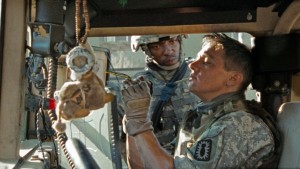 My two theatrical experiences of this latest Best Picture winner were dramatically different, even opposing. The first time around, having just finished my two-year stint in the army, my sympathies lay with sergeant Sanborn (Anthony Mackie), who is tasked with providing cover against potential snipers and bomb-igniters. Both he and I couldn’t stop being frustrated at the wilful bravado of his new bomb-defusal team leader William James (Jeremy Renner), who strutted through potential killzones, held standoffs against cars, and threw away his comms headset at critical junctures, keeping his entire team in mortal risk. So despite a thoughtful gesture towards Sanborn in the sniper scene, I watched with a chilly disposition as James took a turn for the utterly reckless, imagining himself as some Bourne Supremacy-style renegade in two later scenes. Those two scenes, and the ones right after, are clearly positioned to “teach James a lesson”, so I couldn’t stand that The Hurt Locker‘s final scenes seemed eager to regress James into soldierly rock-stardom, with the music to match. Even if this was intended as irony, I felt aggrieved at the thought of siccing James on Sanborn’s wretched successor for a whole year. I left the theatre with mixed feelings, and then came online to discover a baffling ton of buzz for Renner’s performance, compared to almost none for Mackie. What a world!
My two theatrical experiences of this latest Best Picture winner were dramatically different, even opposing. The first time around, having just finished my two-year stint in the army, my sympathies lay with sergeant Sanborn (Anthony Mackie), who is tasked with providing cover against potential snipers and bomb-igniters. Both he and I couldn’t stop being frustrated at the wilful bravado of his new bomb-defusal team leader William James (Jeremy Renner), who strutted through potential killzones, held standoffs against cars, and threw away his comms headset at critical junctures, keeping his entire team in mortal risk. So despite a thoughtful gesture towards Sanborn in the sniper scene, I watched with a chilly disposition as James took a turn for the utterly reckless, imagining himself as some Bourne Supremacy-style renegade in two later scenes. Those two scenes, and the ones right after, are clearly positioned to “teach James a lesson”, so I couldn’t stand that The Hurt Locker‘s final scenes seemed eager to regress James into soldierly rock-stardom, with the music to match. Even if this was intended as irony, I felt aggrieved at the thought of siccing James on Sanborn’s wretched successor for a whole year. I left the theatre with mixed feelings, and then came online to discover a baffling ton of buzz for Renner’s performance, compared to almost none for Mackie. What a world!
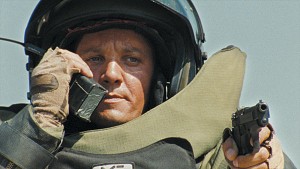 After it re-opened last month, I returned to The Hurt Locker, eager to tether my perspective to James’ and see if that yielded a response closer to consensus. Lo, I found myself taking quickly to the bugger’s sexual charisma, as he grunted for help in removing the mortar-shield from his window, and flashed that rogue grin. By abandoning any notion of “gritty, realistic soldiering in Iraq” and instead tracing the movie’s eagerness to study James as its action star, I settled into a far more comfortable place from which to watch James dive into each new scenario that arose, and then to follow him down his self-inflicted missions. This time I caught, with full force, James’ sentimental logic and muffled desperation within those missions, or in the box of parts from bombs that almost killed him which he keeps under his bed, or in the world of difference between shoving a handgun into an Iraqi’s temple and racing against inevitability to unshackle another from his cage of bombs. The last shot of James, opaque in his bombsuit, transmuted from outraging to bleakly sad. Unfortunately, this made a casualty of Sanborn, who was clearly demoted from co-lead status, his pragmatism now too uptight for the genre’s demands.
After it re-opened last month, I returned to The Hurt Locker, eager to tether my perspective to James’ and see if that yielded a response closer to consensus. Lo, I found myself taking quickly to the bugger’s sexual charisma, as he grunted for help in removing the mortar-shield from his window, and flashed that rogue grin. By abandoning any notion of “gritty, realistic soldiering in Iraq” and instead tracing the movie’s eagerness to study James as its action star, I settled into a far more comfortable place from which to watch James dive into each new scenario that arose, and then to follow him down his self-inflicted missions. This time I caught, with full force, James’ sentimental logic and muffled desperation within those missions, or in the box of parts from bombs that almost killed him which he keeps under his bed, or in the world of difference between shoving a handgun into an Iraqi’s temple and racing against inevitability to unshackle another from his cage of bombs. The last shot of James, opaque in his bombsuit, transmuted from outraging to bleakly sad. Unfortunately, this made a casualty of Sanborn, who was clearly demoted from co-lead status, his pragmatism now too uptight for the genre’s demands.
These two Hurt Lockers still mingle in my mind, more dialectical than coherent. But forbid that an action flick or an Iraq anti-war movie should each stake claims on the other’s domain, or that the greatest overlap in those domains should lie in such gripping and diverse episodes of well-edited tension! I know a few people who, sight unseen, believe The Hurt Locker robbed Avatar‘s Oscar, but there will be others who will now seek this movie out and wage a fair battle against their preconceptions. I couldn’t be happier.
The Hurt Locker | 2009 | USA | Director: Kathryn Bigelow | Screenplay: Mark Boal | Cast: Jeremy Renner, Anthony Mackie, Brian Geraghty, Guy Pearce, Ralph Fiennes, Christian Camargo, David Morse, Evangeline Lilly.
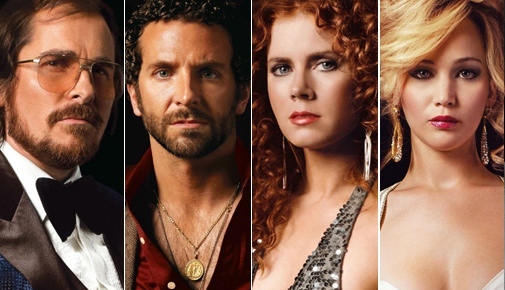

 So the ’09 Oscar season has come and gone, and I’ve managed to blog (sporadically, I know) through a full calendar year without making so much as a post on it. See, while I appreciate that the Academy Awards help to mark the passing of time in the movie-going world, I’m not obsessive enough about them—unlike
So the ’09 Oscar season has come and gone, and I’ve managed to blog (sporadically, I know) through a full calendar year without making so much as a post on it. See, while I appreciate that the Academy Awards help to mark the passing of time in the movie-going world, I’m not obsessive enough about them—unlike  My two theatrical experiences of this latest Best Picture winner were dramatically different, even opposing. The first time around, having just finished my two-year stint in the army, my sympathies lay with sergeant Sanborn (Anthony Mackie), who is tasked with providing cover against potential snipers and bomb-igniters. Both he and I couldn’t stop being frustrated at the wilful bravado of his new bomb-defusal team leader William James (Jeremy Renner), who strutted through potential killzones, held standoffs against cars, and threw away his comms headset at critical junctures, keeping his entire team in mortal risk. So despite a thoughtful gesture towards Sanborn in the sniper scene, I watched with a chilly disposition as James took a turn for the utterly reckless, imagining himself as some Bourne Supremacy-style renegade in two later scenes. Those two scenes, and the ones right after, are clearly positioned to “teach James a lesson”, so I couldn’t stand that The Hurt Locker‘s final scenes seemed eager to regress James into soldierly rock-stardom, with the music to match. Even if this was intended as irony, I felt aggrieved at the thought of siccing James on Sanborn’s wretched successor for a whole year. I left the theatre with mixed feelings, and then came online to discover a baffling ton of buzz for Renner’s performance, compared to almost none for Mackie. What a world!
My two theatrical experiences of this latest Best Picture winner were dramatically different, even opposing. The first time around, having just finished my two-year stint in the army, my sympathies lay with sergeant Sanborn (Anthony Mackie), who is tasked with providing cover against potential snipers and bomb-igniters. Both he and I couldn’t stop being frustrated at the wilful bravado of his new bomb-defusal team leader William James (Jeremy Renner), who strutted through potential killzones, held standoffs against cars, and threw away his comms headset at critical junctures, keeping his entire team in mortal risk. So despite a thoughtful gesture towards Sanborn in the sniper scene, I watched with a chilly disposition as James took a turn for the utterly reckless, imagining himself as some Bourne Supremacy-style renegade in two later scenes. Those two scenes, and the ones right after, are clearly positioned to “teach James a lesson”, so I couldn’t stand that The Hurt Locker‘s final scenes seemed eager to regress James into soldierly rock-stardom, with the music to match. Even if this was intended as irony, I felt aggrieved at the thought of siccing James on Sanborn’s wretched successor for a whole year. I left the theatre with mixed feelings, and then came online to discover a baffling ton of buzz for Renner’s performance, compared to almost none for Mackie. What a world! After it re-opened last month, I returned to The Hurt Locker, eager to tether my perspective to James’ and see if that yielded a response closer to consensus. Lo, I found myself taking quickly to the bugger’s sexual charisma, as he grunted for help in removing the mortar-shield from his window, and flashed that rogue grin. By abandoning any notion of “gritty, realistic soldiering in Iraq” and instead tracing the movie’s eagerness to study James as its action star, I settled into a far more comfortable place from which to watch James dive into each new scenario that arose, and then to follow him down his self-inflicted missions. This time I caught, with full force, James’ sentimental logic and muffled desperation within those missions, or in the box of parts from bombs that almost killed him which he keeps under his bed, or in the world of difference between shoving a handgun into an Iraqi’s temple and racing against inevitability to unshackle another from his cage of bombs. The last shot of James, opaque in his bombsuit, transmuted from outraging to bleakly sad. Unfortunately, this made a casualty of Sanborn, who was clearly demoted from co-lead status, his pragmatism now too uptight for the genre’s demands.
After it re-opened last month, I returned to The Hurt Locker, eager to tether my perspective to James’ and see if that yielded a response closer to consensus. Lo, I found myself taking quickly to the bugger’s sexual charisma, as he grunted for help in removing the mortar-shield from his window, and flashed that rogue grin. By abandoning any notion of “gritty, realistic soldiering in Iraq” and instead tracing the movie’s eagerness to study James as its action star, I settled into a far more comfortable place from which to watch James dive into each new scenario that arose, and then to follow him down his self-inflicted missions. This time I caught, with full force, James’ sentimental logic and muffled desperation within those missions, or in the box of parts from bombs that almost killed him which he keeps under his bed, or in the world of difference between shoving a handgun into an Iraqi’s temple and racing against inevitability to unshackle another from his cage of bombs. The last shot of James, opaque in his bombsuit, transmuted from outraging to bleakly sad. Unfortunately, this made a casualty of Sanborn, who was clearly demoted from co-lead status, his pragmatism now too uptight for the genre’s demands.